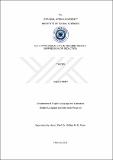Please use this identifier to cite or link to this item:
http://hdl.handle.net/11547/2408Full metadata record
| DC Field | Value | Language |
|---|---|---|
| dc.contributor.author | Şirket, Fulya | - |
| dc.date.accessioned | 2019-06-01T11:26:03Z | - |
| dc.date.available | 2019-06-01T11:26:03Z | - |
| dc.date.issued | 2018 | - |
| dc.identifier.uri | http://hdl.handle.net/11547/2408 | - |
| dc.description.abstract | Modern psikiyatrinin babası olarak, Sigmund Freud, insan ruhuna tüm çatışma ve zorlukların kaynağı olarak yaklaşır, ve insan ruhunun belirleyicileri ile yüzleşmek için bir çözüm arar. Bilinçaltına uzanan bir merdiven olarak düşündüğü bağlantı ve kelimeler yoluyla insan ruhunu çözümlemek için bir araç olarak psikanalizi önerir. Freud’un teorileri, kendi iç çatışmaları ve toplumun kültürel çatışmaları ile mücadele etmek zorunda olan, modern edebiyatın öncü isimlerinden Virginia Woolf’u etkiler. Woolf, psikanalizi, hayatının belirleyicisi olan, ruhun derinliklerini keşfedebilmek için kullanır. Bu tez, Virginia Woolf’un uğradığı cinsel tacizler sonucunda acı çektiğini, Freud’un yaklaşım ve teorilerinden etkilendiğinini, iyileşmek için öz psikanalize başvurduğunu kanıtlamayı hedefler. Bu tez aynı zamanda Virginia Woolf’un hayatını, edebi kişiliğini ve Mrs. Dalloway, To the Lighthouse ve Moments of Being olmak üzere üç eserini psikanalitik bakış açısıyla tahlil eder. Bu tezde yapılan tahliller, Freud’un psikanaliz, savunma mekanizmaları, yaratıcı yazarlar ve onları harekete geçiren güçler konusundaki yaklaşımlarını ele alan ifade ve açıklamalarla desteklenmiştir. Bu tez, aynı zamanda, Virginia Woolf’un, kökeninde psikolojik ve entelektüel mirasının, çocukluk anılarının, savunma mekanizmalarının, cinsel eğiliminin ve hayatındaki cennet-cehennem nöbetlerinin yarattığı zorluklarının yansıtmaktadır. Virginia Woolf’un hayatını zorlaştıran bu sıkıntıların yansımaları, ayrıca, 1939 yılında eşiyle birlikte kendisini ziyarete gidene kadar çalışmalarını okumadığını iddia ettiği Freud’un teorilerini farkında olmadan haklı çıkardığı eserleri yoluyla incelenmektedir. | tr_TR |
| dc.language.iso | tr | tr_TR |
| dc.publisher | ISTANBUL AYDIN UNIVERSITY INSTITUTE OF SOCIAL SCIENCES | tr_TR |
| dc.subject | Virginia Woolf | tr_TR |
| dc.subject | Sigmund Freud | tr_TR |
| dc.subject | Öz psikanaliz | tr_TR |
| dc.subject | Yaratıcı yazarlar | tr_TR |
| dc.subject | Cinsel eğilim | tr_TR |
| dc.subject | Baskılama | tr_TR |
| dc.subject | İntihar | tr_TR |
| dc.subject | Eros | tr_TR |
| dc.subject | Thanatos | tr_TR |
| dc.subject | Virginia Woolf | tr_TR |
| dc.subject | Sigmund Freud | tr_TR |
| dc.subject | Self-psychoanalysis | tr_TR |
| dc.subject | Creative writers | tr_TR |
| dc.subject | Sexual tendency | tr_TR |
| dc.subject | Suppression | tr_TR |
| dc.subject | Suicide | tr_TR |
| dc.subject | Eros | tr_TR |
| dc.subject | Thanatos | tr_TR |
| dc.title | SELF-PSYCHOANALYSIS IN VIRGINIA WOOLF: SUPPRESSION OF SEDUCTION | tr_TR |
| dc.type | Thesis | tr_TR |
| dc.description.abstractol | Sigmund Freud, as the father of modern psychiatry, approaches the psyche as the source of all conflicts and challenges in life and he chases after a solution to confront the determiners of the psyche. He proposes psychoanalysis as a device to analyze the psyche through words and associations which are considered a ladder reaching the unconscious. Freud’s theories influenced Virginia Woolf, one of the pioneers of modern literature, who had to struggle with her internal conflicts and the cultural conflicts of society. Woolf uses psychoanalysis as a means of exploring the depths of the psyche, as the determiner of her life. This thesis aims to prove that Virginia Woolf suffered from the consequences of sexual harassment, she was influenced by Freud’s approaches and theories, and she applied self-psychoanalysis in order to realize her self-healing. This thesis also provides an analysis of Virginia Woolf’s life, her literary identity and three of her works, Mrs. Dalloway, To the Lighthouse and Moments of Being in terms of psychoanalysis. The analyses performed in this thesis are supported by the statements and the explanations about Freud’s approaches in psychoanalysis, defense mechanisms, creative writers and their motives. It also reflects Virginia Woolf’s challenges sourced by her psychological and intellectual heritage, her childhood memories, her defense mechanisms, her sexual tendency and the shifts of heaven and hell in her life. The reflections of the difficulties which Virginia Woolf suffered are also examined through her works, by which she unconsciously justifies Frued’s theories, which she claims not to have read until she and her husband visited him in 1939. | tr_TR |
| dc.publisher.firstpagenumber | 1 | tr_TR |
| dc.publisher.lastpagenumber | 88 | tr_TR |
| Appears in Collections: | Tezler -- Thesis | |
Files in This Item:
| File | Description | Size | Format | |
|---|---|---|---|---|
| 517628.pdf | 971.17 kB | Adobe PDF |  View/Open |
Items in DSpace are protected by copyright, with all rights reserved, unless otherwise indicated.
